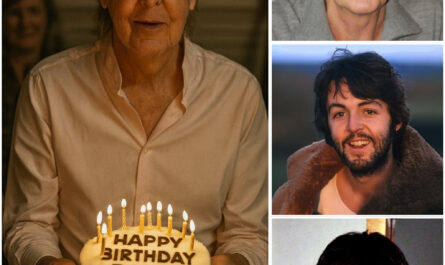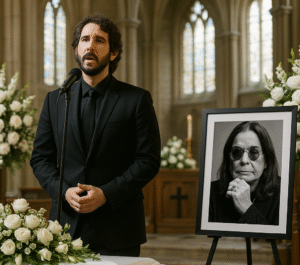After bands like The Beatles, the Rolling Stones and The Who changed the course of Rock and Roll in the early 1960s, a second generation of British bands emerged by the end of that decade to once again show the world that music would keep evolving.
One of those groups was Deep Purple, which featured the legendary guitarist Ritchie Blackmore, responsible for some of the most memorable riffs and solos in music history.
Over the course of his career, Blackmore had the chance to meet and see many incredible musicians from his generation perform.
Also known for being quite sincere, he has often shared his opinions on some of them, including the late Led Zeppelin a drummer John Bonham.
What is Ritchie Blackmore’s opinion on John Bonham
Ritchie Blackmore was not a big fan of Led Zeppelin but he admired John Bonham. “No. I don’t really admire them. Bonham, the drummer’s good. And John Paul Jones is a very good string arranger. I admire anybody that can be that big, like The Stones. I don’t like The Stones’ music, but I admire them because Jagger’s kept them together for that long. And to keep coming back and still blowing everybody off popularity-wise is an art in itself. It might not be music, but it’s,” Ritchie Blackmore said in an interview with Steven Rosen in 1975.
The guitarist was a good friend of John Bonham and as Deep Purple and Rainbow fans know, he always had a peculiar sense of humor and liked to sometimes put people on the edge. One night back in the 70s, he was at the historic Rainbow Bar & Grill in Los Angeles with the Led Zeppelin drummer. Provoked by his friend, he began pointing out from where Jimmy Page was “stealing” their riffs, which got Bonham thinking.
“I used to be very friendly with Bonzo from Led Zeppelin. We’d be sitting drinking in the Rainbow – and he’d be really up and drunk or really depressed. So he’d be looking at the table. And he used to say to me: ‘It must be really hard to stand there and go: ’der-der-derr, der-der, de-derr’ (Smoke On The Water). ‘Yeah, it’s nearly as difficult as going: ‘duh-der duh-der dum’ (Whole Lotta Love). At least we don’t copy anybody!’ He goes: ‘What are you talking about? That’s bullshit!”
He continued:
“I know exactly where you got ‘duh-der duh-der dum’ from; you got it from ‘Hey Joe’, you just put it to a rhythm.’ And he’s thinking. ‘And ‘Immigrant Song’ was ‘Little Miss Lover’. ‘What are you talking about?’ ‘Bom-bobba-didom ba-bom bobbadidom…’ He was not a happy man, but he started it. We then went upstairs to the toilet. We’re both there, weeing away, and he says: ‘Rich, did you mean all that?’ I said: ‘No, not really. I was just having a go back at you.’”
“He says: ‘Oh. I didn’t mean it either. There’s room at the top for everybody.’ So we carried on weeing, then went downstairs and started drinking again.”“But he loved it. He was the kind of guy who liked confrontation, and I would always give it to him. But I always remember when he said how we’d taken bits and pieces from people, so I told him where he got his stuff from. It was interesting to see how his mind was going: ‘Pagey, you bastard. Now I know!’ They were good days. So I had some very funny times with John Bonham, and Keith Moon too. I was living in LA, Keith used to come up to the house all the time. I used to supply the people, and he would supply the goods,” Ritchie Blackmore told Neil Jeffries back in 1995.</p>
Deep Purple and Led Zeppelin were both formed in London in 1968, but Purple managed to release their debut album first, that same year. However, a few years later, inspired by Zeppelin, they released Deep Purple in Rock (1970), moving closer to Hard Rock and making their music less Progressive than it originally was.
Ritchie Blackmore said Led Zeppelin influenced Deep Purple
Deep Purple and Led Zeppelin were both formed in London in 1968, but Purple managed to release their debut album first, that same year. However, a few years later, inspired by Zeppelin, they released Deep Purple in Rock (1970), moving closer to Hard Rock and making their music less Progressive than it originally was.
“Zeppelin. I liked their hard approach when they came out and did ‘Whole Lotta Love’. I immediately tuned in with that type of style because before when we were fiddling around with orchestras, I thought: something’s wrong. I’m not giving all that I can. Thanks to them for the inspiration. They got it from Jeff Beck, who got it from the Small Faces,” Ritchie Blackmore said in an interview with Trouser Press in 1978.
In Blackmore’s opinion, Led Zeppelin helped to sophisticate Rock and Roll, pushing other bands to constantly try to do better. When talking with Kerrang! magazine in 1984 he said that and used the track “Kashmir” as an example.
“I think Van Halen are interesting. I don’t particularly like them as a band. But there is a lot of movement, a lot of colour to the material they produce. Led Zeppelin too, now they probably defined the term ‘sophisticated rock’. Things like ‘Kashmir’, the certain, the certain scales they would hit… that was incredible,” Ritchie Blackmore said.
Ritchie Blackmore said Bonham would always tell Led Zeppelin he was leaving
According to Blackmore, who had the chance to meet Jimmy Page before they both got famous and to get close to Bonham, the drummer was not happy with his job all the time. As he recalled in a chat posted on his Youtube channel, the musician always told Zeppelin he would leave the group. “John Bonham would always tell Zeppelin: ‘I’m leaving the band. I can’t go back to America again. I can’t do that.’ So, Peter Grant (Led Zeppelin’s manager) used to go, ‘Hey, come to the garage, I want to show you something.’ He’d go, ‘What?’”
“They’d go to his garage and there’s a new Lamborghini, just what Bonzo wanted. And that’s how he kept coming. But there were a couple of moments there where he ended up crying because he wanted to go home. He didn’t want to be in America, missed his wife, didn’t want to be in a big band. (Bonham) wanted to be in a small band in Birmingham, just playing. He didn’t care about all that fame,” Ritchie Blackmore said. Bonham was three years younger than Blackmore but sadly tragically passed away too soon back in 1980 at the age of 32.
Deep Purple, Rainbow and Led Zeppelin are to this day three of the biggest British Hard Rock bands of all time. They were extremely important for the evolution of heavier music and inspired countless musicians over the years.





